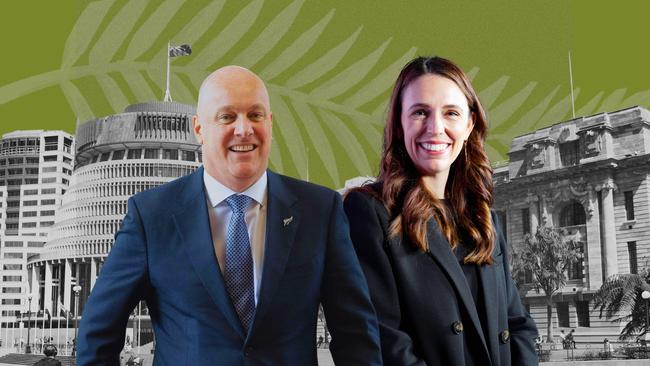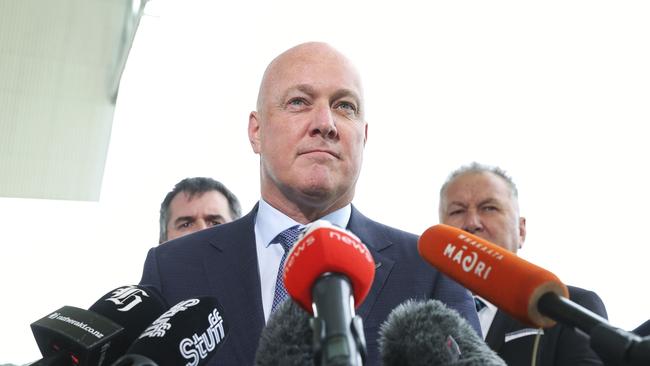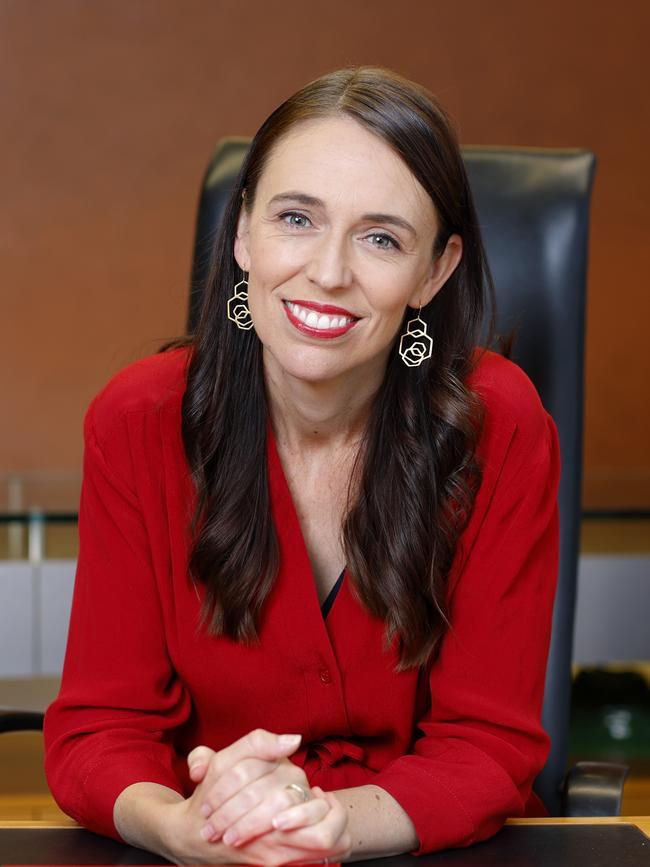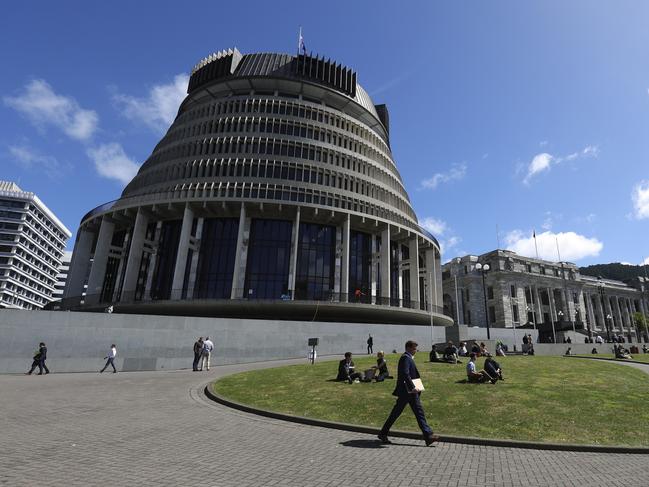Shaking up the shaky isles: Christopher Luxon determined to get NZ back on track
Christopher Luxon is brimming with energy, confidence and a determination to get the NZ economy, and society, moving. But he has a couple of truly shocking things to tell me.

The most shocking is this: “Fifty-four per cent of our kids are not in regular school attendance.”
For a First World nation, especially one that once enjoyed a reputation as the epitome of undramatic common sense, that’s a staggering statistic.
Luxon continues: “By the age of 15, they will lose about a year’s education. It’s the statistic that over the last three years (his time in politics) has kept me awake most at night. Some 50 per cent of our kids are not ready (not at the required standard) when they get to high school. We’re doing poorly in comparison with Australia, the UK, Canada and other nations we look to.”
Let’s go away from education to another Luxon shocker fact: “The previous government (of Jacinda Ardern) increased government spending by 84 per cent. They increased debt from $NZ5bn ($4.6bn) to $NZ100bn. They hired 16,000 more public servants. There was a massive increase in consultants. Hospital wait lists went through the roof. There was a huge rise in youth crime.
“So the previous government spent more, borrowed more, taxed more, hired more bureaucrats and actually delivered worse outcomes. To achieve that combination takes a very unique skill set.”
Maybe not quite so unique in politics as Luxon would wish.

Ardern now enjoys two separate fellowships at Harvard University, which shows how astonishingly perverse Western universities have become, for the chief service to education the experience of her government offers is how spectacularly even a short period of truly dreadful government can mess up a previously successful country.
In fairness to Luxon, he doesn’t say a disparaging thing about his predecessor by name. He’s a positive guy, with a familiar CEO manner of directness and can-do optimism. But to have any chance of turning New Zealand’s dismal recent performance around, he has to tell his countrymen exactly how big the problems are and how big the adjustments will be.
One of his colleagues, Regulation Minister David Seymour, leader of the free-market ACT party that is in coalition with Luxon’s Nationals, in a separate interview tells me the challenge, not just for the government but for the whole nation, is whether New Zealand can hold on to its status as a First World nation with a First World economy, services and living standards.
In a powerful State of the Nation speech in late February, Luxon offered other shocker facts, all gruesome but true. Since 2000, New Zealand students have fallen from fourth in the developed world for mastery of maths to 19th. There are 70,000 more New Zealanders on Jobseeker unemployment benefits than there were in 2017.
Luxon said in that speech: “New Zealand’s economy is now less productive than vast swathes of the former Eastern Bloc, including Poland, Slovenia, Slovakia and Lithuania … The median full-time worker in Australia now earns $20,000 more a year than someone in New Zealand.”
Partly for that reason, there are more than 600,000 New Zealanders living in Australia, many among the brightest their nation produces.
Luxon in conversation amplifies the social and economic cost of the last government’s radical increase in spending: “That drove into domestic inflation, which led to higher interest rates, and that led to recession and growing unemployment … We’ve had a recession. Four out of five of the last quarters have seen negative growth and we’ve got a structural deficit.”

Notwithstanding all of those facts, Luxon is brimming with energy, confidence and a determination to get the NZ economy, and society, moving. His success is important not only to his own electors; it matters deeply to Australia, even if this is not widely understood. A successful New Zealand enlarges Australia in every way and is a critically important strategic partner in the South Pacific, and also, with a sensible government, more broadly.
Australia is home to 27 million people, New Zealand to 5.5 million. That’s nearly 33 million people with a First World standard of living. That’s formidable if considered as a single economic space, a single intellectual and consumer market, not quite a single culture but two closely related cultures. Once it was doctrine of both nations that we were a single strategic space. Maybe we won’t quite ever be that again, but Luxon wants to bring the two nations closer strategically. That’s good news for Canberra.
As recently as the 1990s New Zealand’s per capita income and living standards were much closer to Australia’s than is the case today.
Back in the ’80s, NZ’s legendary leader Robert Muldoon could joke that Kiwi migration to Australia raised the average IQ of both nations. There was a time, when former PM Mike Moore went on to head the World Trade Organisation, when former PM Helen Clark became the head of the UN Development Program and when former foreign minister Don McKinnon became secretary-general of the Commonwealth, when senior Kiwis were a powerful presence internationally. But that has fallen away in recent years.
The All Blacks remain dominant in world rugby, and that’s a great thing. But just as Brazil’s peerless strength in soccer doesn’t make it a successful economy, this is true of NZ as well. Notwithstanding all the Ardern fraudulent fancy fairy dust, New Zealand has fallen away from meaningful institutional engagement with the world in the past several years.
Here is one indicative straw in the wind. Quite shockingly, though it spends more than $1bn a year of taxpayers’ money, Australia’s ABC doesn’t have a resident New Zealand correspondent. It closed its bureau when Ardern was PM.
Luxon wants to recapture the world’s attention. I meet him in the quite modest Prime Minister’s office in Wellington’s famous Beehive parliamentary building, which derives its name from the resemblance its strange conical shape gives it to a beehive.

He wants not only to re-energise New Zealand but also to recapture the world’s attention. His own story is inspiring enough.
Now 53, Luxon was not born to wealth or power. His parents left school in their mid-teens. He got a good education at a state school, was the first in his family to go to university, graduated in commerce from the University of Auckland and headed off into a stellar corporate career at Unilever, then running Air New Zealand. He lived away from NZ for 16 years, including stints in Australia, New York, Chicago and Canada.
“The key message I’m sending out is that New Zealand is under new management and we’re open for business. We want to bring ambition and aspiration … We want to be one of the leading small countries on Earth. That means building a world-class education system; providing modern, reliable infrastructure; embracing science and technological change; being an easy place to do business; having strong relationships and partnerships with the world.”
On the domestic front, Luxon’s government has already taken a blizzard of actions. “There was a lot of high and mighty language, but the ideological projects ended up not delivering anything,” he says.
So he has axed a lot of them – Auckland light rail; a project called Let’s Get Wellington Moving that had six years of discussions and no movement. In education he has made a raft of critical, early reforms. He has ensured that in every primary school there is one full hour a day on mathematics, another on reading, another on writing. He has banned mobile phones in schools. The government has formally committed to phonics in teaching literacy. It has rejected the fuzzy so-called student-centric approach to curriculum and instead will produce a national curriculum on history, English, maths and other subjects by the end of the year. These will be taught across NZ schools.
His government quickly cut or abolished a raft of taxes, among them the so-called ute tax and the Auckland Regional Fuel Tax.
Most important are two early economic reforms. He’s getting rid of the previous government’s re-regulation of the labour market, including by allowing 90-day trials and abolishing Fair Pay Agreements. Even more important, he has retuned the Reserve Bank of New Zealand to its old practice of having one objective: price stability.
It’s surely worth noting that these are the opposite to policy measures the Albanese government has adopted. Last year, the Albanese government required the Reserve Bank of Australia to give equal weight to full employment as to inflation. And it has moved at a furious pace to re-regulate the labour market. It’s as if New Zealand and Australia were two family members who each took a different train, coming from opposite directions to a common station. They got off, waved at each other and switched trains, the Albanese government emulating some Ardern policies and NZ boarding the train to common sense. Luxon, of course, didn’t make any such comparison.
His government has also won some international comment for its new approach to Maori issues. Luxon is not revolutionary here but is moving away from much of the co-governance model of his predecessor. Nonetheless, there is a limit to his challenge to NZ orthodoxy on this: “We do believe in the Treaty of Waitangi (an 1840 treaty between the British Crown and Maori tribes) as a foundational document that must be honoured. It wasn’t honoured historically, so since 1995 we’ve had settlements with individual tribes. That typically involves an apology and redress financially.
“Many of those tribes have built businesses and the Maori economy has become an important part of our economy. But we don’t support co-governance of national public services. We’re all equal citizens and we don’t want a separate Maori health system and a non-Maori health system. We want to have one national health system. We want one education system.”
In response to questioning, Luxon outlines examples of the new government’s policy. It abolished the Three Waters initiative. This, he says, took away water management rights from 67 district councils that had managed them for decades and gave the power instead to 10 new authorities with co-governance (Maori and non-Maori) models. Luxon’s government restored control to the 67 district councils.
A further reform of councils is fascinating. Some councils have dedicated Maori wards. This too is part of the idea that Maori and non-Maori have to be elected separately. Luxon’s government has provided that to have dedicated Maori wards, in which only Maori can vote and be elected, a council must hold a referendum of all its voters on the issue. Local communities where a majority vote to have separate Maori representation are welcome to do so. In local council areas where the population votes against it, all citizens will vote and stand for election regardless of their racial background.
Those campaigning against this measure claim Luxon’s government is overriding local communities. But it’s impossible to see this reform as other than empowering local communities, though perhaps at the expense of local bureaucrats or politically correct dogma.
In strategic matters, Luxon wants to get closer to Australia. He has a comprehensive vision of this: “We want to deepen our relationship with our traditional allies. Our No.1 priority is our relationship with Australia, in what is a more competitive geo-strategic environment. On security and defence, I really want NZ to be a force multiplier, and interoperable with Australia. That’s our only ally.
“There’s work for us to do together in the Pacific, how we buttress our Pacific Island nation partners and friends, knowing it’s a more competitive geo-strategic environment.
“And the third area is there’s an opportunity to put more life into the economic co-operation agenda (between Australia and NZ). There’s probably a need for us to reframe what an economic relationship could look like.”
Luxon plans to do more than recent NZ governments on defence (in truth it would be challenging to do much less): “All three parties in our coalition (National, ACT and NZ First) want to spend more on defence. We think that’s important.” In the meantime, he points to strong signs of more intimate Canberra-Wellington co-operation: “There’s lots more tensions in geopolitical matters, in our part of the world, the Indo-Pacific; in Russia’s evil war against Ukraine; in the Israel-Gaza conflict. You’ve seen us get more aligned on those issues through joint statements (of leaders from Australia, NZ and Canada). We’ve both (Canberra and Wellington) contributed military personnel to the Red Sea operations against the Houthis; we’ve both put aid packages together to support Ukraine.”
The Luxon government recently called out China publicly over a cyber attack, a most unusual move for Wellington.
Luxon says: “Our position’s probably not that dissimilar to Australia’s. We have a longstanding, complex and significant relationship with China. There are massive areas of co-operation over trade and climate.
“At the same time we acknowledge that we have different values, and differences on a range of issues. We’ll consistently articulate those privately and publicly.”
One area where Luxon’s government agrees with Canberra and disagrees with Beijing is AUKUS: “Our view is that AUKUS is very good for our region. It provides greater security and greater prosperity ultimately. Like the previous government, we want to be able to explore NZ participation in pillar two (technical co-operation other than nuclear submarines) of AUKUS.
“We believe the AUKUS subs and AUKUS are completely in compliance with the Treaty of Rarotonga (the South Pacific nuclear-free treaty).”
NZ left the ANZUS alliance in 1986 because it decided it would not allow nuclear-armed or nuclear-powered ships to visit its ports. It wanted the US to certify that any naval vessel that visited NZ was neither nuclear-armed nor nuclear-powered. The US, naturally, wouldn’t do this. ANZUS died and the US-Australia alliance became a two-party partnership of ever greater intimacy, while Wellington lost strategic relevance as it abandoned its magnificent military inheritance and all the vast influence that came from being an ally in good standing of the US.
Australia is due to get its first nuclear-powered submarine in just eight years, 2032. Given Australia’s AUKUS subs will never carry nuclear weapons, could they ever be welcome in NZ ports? “That’s something we’ll look at,” Luxon says. “It’s something we haven’t yet contemplated. I appreciate the submarines are still some distance from materialising yet.”
That seems as promising as it could possibly be, but Luxon, perhaps realising he might have, in friendship and trans-Tasman solidarity, gone one centimetre further than intended, quickly emphasises that NZ’s policy bans the visit of both nuclear-armed and nuclear-powered naval vessels, and there has been no change in the policy.
At one point in our discussion, Luxon comments that only through rigorous fiscal discipline is a government able to take care of its people, and incidentally to make desired investments in areas such as defence. Here is a Kiwi leader back inhabiting the realest of real worlds. He’s not daunted by the challenges. He thinks his native NZ is still the best and luckiest country in the world, and he wants it to realise its potential.
He has miles and miles to go before he sleeps. And more than just New Zealand rides on his success.





Christopher Luxon, the urbane businessman newly in charge of our beloved neighbour across the ditch as New Zealand’s recently elected prime minister, has a couple of truly shocking things to tell me about the task ahead.